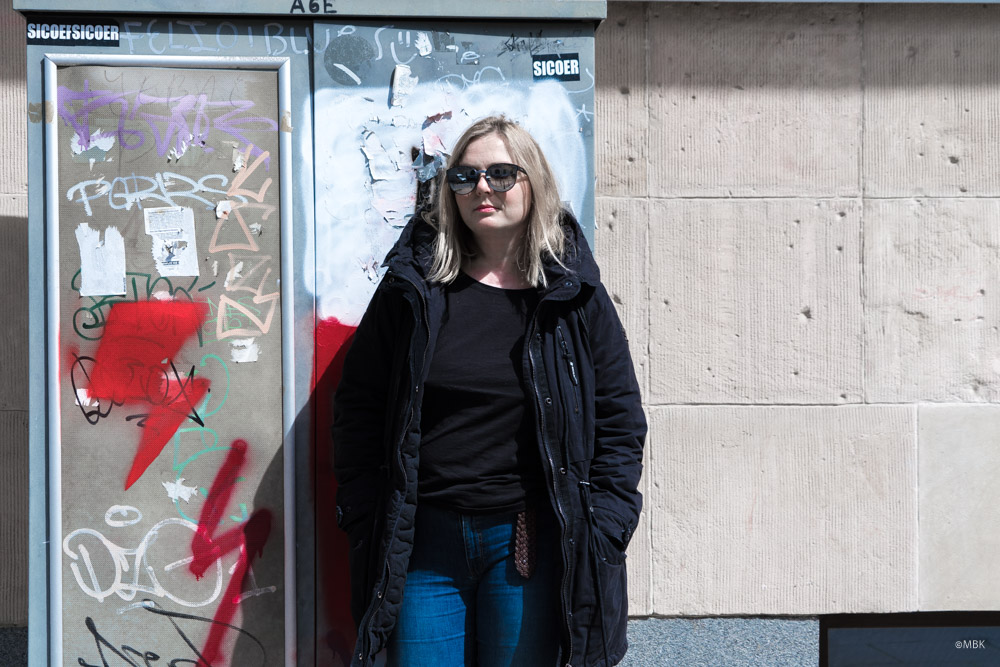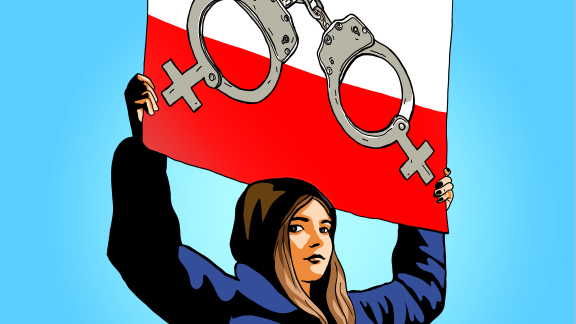Human rights defenders in Poland have been working tirelessly for years to fight the dismantling of the rule of law and human rights. They continue to do so in the face of increasing oppression, orchestrated and encouraged by the government – including intimidation, detention, and criminal charges. Many have been subjected to threats and attacks, both from state actors and far-right groups. The Polish Women’s Strike and other organisations have received bomb threats and now need to have security at their buildings. Activists are also being targeted with smear campaigns in state-owned media. The actions of the police have been insufficient to ensure their protection.
These are their stories.
Dariusz: A Rebellious Defender Of Rights
Dariusz is a gentle soul, shy even, yet he is one of the most famous and recognisable activists in Poland. Dariusz became famous for dressing up as a priest during a 2019 Equality Parade and the photo of Dariusz at the head of the colourful procession was circulated across Poland causing widespread uproar. No stranger to controversy, in December 2018, Dariusz was also accused of painting a statue of Pope John Paul II to make it look like he was crying bloody tears. There were also placards, which read: “I covered-up for paedophiles”, “paedophilia is a crime” and “we believe the victims”. He was charged with three counts of vandalism, destruction of property and public desecration of a religious monument, punishable by up to five years in prison. The prosecutor was PiS (Law and Justice) party municipal councillor, Sebastian Kucharczyk, a fundamental Christian conservative.
Dominika: The Women’s Strike Protesters Are On The Right Side Of History
Dominika is the leader of the Women’s Strike in a small city in the North Easterly part of Poland. Dominika started out locally, but now works for the Women’s Strike Foundation; the “central helpdesk” for activists in the field. She has been embedded in the Strike movement from its inception in 2016, and is now part of the Women’s Strike strategic group, as well as being a board member. As a PR specialist and journalist, she helps organise external and internal communications. She coordinates the international campaign, translates interviews, and runs the Strike’s Instagram page.
Hanka: I Can’t And Don’t Want To Let Go. The Strike Is A Part Of Me
Hanka is undoubtedly one of the most distinctive and memorable strike activists; a true Silesian firecracker. She is the kind of person who could coax a cloud down to earth. Although she is only one metre fifty in a hat, Hanka seems at least three feet taller. Especially when she speaks. For such a petite person, she has an immensely deep and powerful voice. She is feisty too, with a hard, faraway gaze. Her hairstyle – a white mohawk and a shaved neck – serves as a warning; don’t mess with me. She is definitely the type of person you wouldn’t want to argue with but she commands respect in a natural and unforced way.

Dorota: Women Are The Force That Will Change This Country
Dorota’s name in Poland is synonymous with the fight for good education. And, at this stage, she is a strong personal brand. Perhaps the average Joe doesn’t associate Dorota with black clothes, war painted cheeks, blazing flares, expletives roaring from a protest bus, and everything else that springs to mind when hearing the slogan ‘Women’s Strike’. But she is an important activist in this unique women’s movement. When she appears in public in colourful dresses or elegant suits, often with rainbow-coloured accents, she always wears a badge with the ‘Women’s Strike’ logo.

Bożena: Courage And Faith In Success
That Bożena dislikes the church is probably the biggest lie about her. A myth spread intentionally by her opponents as her speciality is secularism. For years, she has been advocating for the separation of church and state. Bożena was the driving force behind the wave of unprecedented protests outside churches across Poland on 25 October 2020. But this was the culmination of several years of action. In 2016, Bożena organised the satirical “Polish Episcopal Conference”, which was the first church protest of its kind in Poland. By 2019, she had organised more than a dozen protests in front of Warsaw churches, including on 23 March 2018. The secular state protest she organised on that day was part of a much larger protest known as Black Friday, which was attended by around 100,000 people.

Katarzyna: Krakow’s Unrelenting Activist
Katarzyna is petite with childlike beauty and the characteristic hoarse voice of a mature woman, she is also one of the most prolific and celebrated activists within the Women’s Strike movement across Poland. A cursory glance at the media reports and Internet commentary paints an intriguing picture of Katarzyna as sassy, loud, bold and uncompromising, as well as stubborn, complicated, hot-headed and wild.
It was Katarzyna who asked President Andrzej Duda about why he constantly ignores the constitution and on December 18, 2016, alongside others, she blocked PiS Leader Jaroslaw Kaczyński and his cabinet from entering Wawel castle.

Klementyna: In The Face Of Adversity
Klementyna is pragmatic when she talks about the challenges women’s rights defenders face in Poland; an act of self-preservation in the face of mounting charges brought against her by the current ultra-conservative PiS government. She has been accused of inciting and leading protests in the wake of increasingly regressive abortion legislation in the country. She faces eight years in prison for charges brought on under the pretext of violating Covid-19 rules.

when
country
Poland
Subject
Abortion Care









